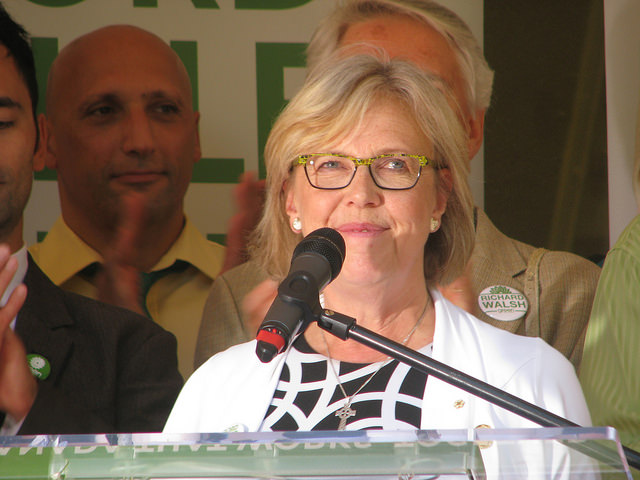Like this article? rabble is reader-supported journalism. Chip in to keep stories like these coming.
Like so many Canadians I signed the petition asking that Elizabeth May be made our next Environment Minister. My decision to sign was quick, almost reflexive: among our politicians, May is easily one of the most passionate and well-informed on environmental matters.
I’ve come to think, however, that my eagerness to sign the petition had more to do with the euphoric feeling I had after an election that saw the rejection of a particularly cynical and divisive brand of politics.
If the previous government was characterized by anything, it was a refusal to listen to voices expressing different viewpoints. What we’re experiencing with climate change, with pollution, with shrinking natural space, is a direct result of not being able to listen, of not incorporating ripple effects into decision making, of acting with self-interested blinders on. What better way for Trudeau to start anew, to signal a desire to listen to others, to incorporate different experiences and viewpoints in decision making, than to appoint an MP from another party to a key post?
Since signing the petition I’ve read and heard a few things that make me question the wisdom of having the leader of the Green Party as minister, and in this regard I’d like to make three points.
1. If successful, the petition and May’s appointment would likely be the end of the Green Party as we know it.
As the cliche goes, “politics is the art of compromise,” and so the ground beneath you shifts as one thing is traded against another, as your friends change, as things you thought impossible before emerge with tantalizing potential. If there’s a conscience in parliament Elizabeth May and the Green Party are it. She’s been the voice that speaks truth to power, the presence you can count on to give an honest answer. It’d be a shame to lose that voice to the murkiness of realpolitik.
2. The Liberal Party has many excellent candidates to chose from.
Stephan Dion should probably be at the top of any list for the post. As a former Minister of Environment, as well as Intergovernmental Affairs, Dion has a wealth of experience and knowledge to bring to the portfolio, and would ably increase its profile in the new government.
The new minister will have to confront the alarming and rapidly growing challenge of climate change, and be at the forefront of shifting our society from a dependence on fossil fuels toward renewable, more efficient forms of energy. On its own this is a daunting task. Even more daunting, however, is the challenge climate change and environmental degradation present when they’re viewed as the product of a particular way of structuring or organizing resources.
The centralized and inefficient forms of energy we’re required to shift away from reflect a form of social organization that is itself centralized and inefficient. A highly stratified society characterized by conspicuous consumption, for instance, forms in effect a vacuum that sucks up resources, both natural and human, in the most wasteful and careless manner.
Decentralized, participatory decision-making that incorporates the best information possible, accounting for as wide a spectrum of viewpoints as possible, would begin to change this dynamic, and could form the underpinning of a social reorganization that begins to care for Earth’s resources more efficiently. The inclusive stance demonstrated by the Liberals so far, though it is early, suggests a possible beginning to such change.
This willingness to listen leads me to my third and most important point.
3. Indigenous peoples’ knowledge of and approaches to nature and the environment should form the core of Canada’s relationship with the environment.
The Liberals were elected, in no small part, thanks to a upswell of engagement and support from Indigenous voters. They’ve committed to a renewed relationship with Indigenous peoples, including rekindling the nation-to-nation relationship, establishing an inquiry into missing and murdered Indigenous women, as well as implementing the recommendations of the Truth and Reconciliation Commission. They also have eight MPs who are Indigenous.
The intimate and meaningful connection many Indigenous peoples have with nature, and which runs strong in the current of their cultures and traditions, has, it strikes me, something to do with a caring for and listening to voices that speak from different experiences.
This ability to listen, to care for and work together with the other, forms the foundation of any truly sustainable relationship. If the newly elected government is serious about fostering such a world for our children, it must continue and further strengthen capabilities for listening and learning from others.
Enabling an Indigenous MP in this regard, as the minister or in partnership with the minister, could begin a process of reinvigorating our democracy and our relationship with the natural world in a profound and meaningful way. What a legacy this would be for our children!
Photo: flickr/ Laurel L. Russwurm



